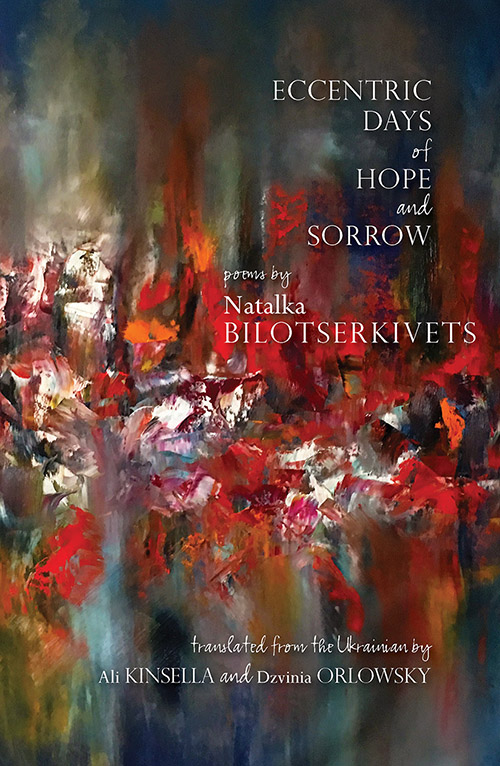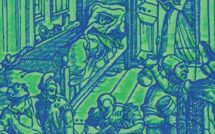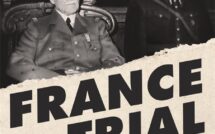
Eccentric Days of Hope and Sorrow by Natalka Bilotserkivets (translated by Ali Kinsella and Dzvinia Orlowsky)

This is part of our special feature, Europe and NATO Since Ukraine.
The Ukrainian lyric poet Natalka Bilotserkivets (b. 1954) is best known for a melancholy love poem, “We’ll not die in Paris,” which was censored by the Soviet authorities (“why can’t you die a beautiful death in the Soviet Union?” she was asked).[i] Some years later, in 1991, the Ukrainian rock band Mertvyi Piven (Dead Rooster) set the poem to music and “We’ll not die in Paris” became the spontaneous anthem of the Ukrainian independence movement after it premiered at a youth music festival. Bilotserkivets recently recalled that she was startled to hear the song and moved by the poem’s new life in post-Soviet Ukraine. Yet outside of this association, her work remains largely unknown to European and American readers. Spanning the decades between the early 1980s and 2004, many of the poems in Eccentric Days, with their juxtapositions of pain and confusion, hope and comfort, are as emblematic of Ukraine’s present catastrophe as the opening stanza of “We’ll Not Die in Paris” was of those first exhilarating months of Ukrainian independence: “You forget the lines smells colors and sounds/sight weakens hearing fades simple pleasures pass/you lift your face and hands toward your soul/but to high and unreachable summits it soars.”
In a 1993 anthology of contemporary East European poetry, Larissa M. L. Zaleska Onyschkevych observed that
Modern Ukrainian literature has had a very capricious fate. There were several periods when its sudden downward slides proved fatal to many poets… The 1980s have delivered a poetry that is rejuvenated, strong, and thriving and one that also provides inspiration to Ukrainian poets in the diaspora… This poetry also demonstrates that despite periods which have brought about an almost complete annihilation of Ukrainian literature, each new wave of poets was still able to build on the heritage of their predecessors.[ii]
Natalka Bilotserkivets was at the forefront of Ukraine’s literary renaissance in the 1980s and has continued to publish steadily. Now the mortal dangers faced by Ukrainian writers and their fellow civilians since Russia’s unprovoked invasion in February 2022—unleashing the latest “sudden downward slide,” as it were—also creates space for the rediscovery of, or the introduction to, Bilotserkivets’ poetic gifts. Her translators, Ali Kinsella and Dzvinia Orlowsky, note that Bilotserkivets forged an unusual path among her contemporaries; her poems avoided the bombastic language of the (approved) socialist realist genre, but neither were they polemical enough for the authorities to silence her altogether. Instead, many of her poems rebuked the repressive, corrupt, and crumbling Soviet state from the vantage point of an anonymous viewer struggling to see through smudged glasses. In “Stumbling Among Stars Of a despairing world,” published in 1984, Bilotserkivets gives voice to the claustrophobia of life in the freezing, drab cities of Kyiv and Lviv even as it rains in Paris and Lima. Both the snow in Ukraine, “sticking to our eyes and glasses,” and the rain in distant cities “fogging their glasses/and the gray headlights of tired taxis,” underscore the exhausting work of seeing clearly. Nonetheless, she urges readers to “share this midnight coffee/with the homeless under dingy bridges—/give them half your cigarette/and half of my tender words./Let’s share our midnight bread/with the hungry; not passing over the dead/with their hungry homeless mouths./Yet another shabby star,/when I look through my wet glasses—/the dense, raining snow./Let’s walk like this, to parks, to the boulevards.”
In other poems, Bilotserkivets mocks both harsh Soviet bureaucrats and the slick politicians elected in the years following Ukrainian independence. In “Not Everyone Has Returned,” she condemns the “state machine” that “ground their bones and minds” and demands,
Let us into the archives—the lists, the denunciations, reports,/To the soft dispositions, the hard red revolutions,/To know in person who stoked those October embers/and eviscerated the country by counterrevolutionary fires/Here a people died out. Here vodka crushed parents./Here peers languished from acetone and rock./While at the top, powerful portraits of leaders floated,/A mustache twitched, eyebrows furrowed self-righteously.
And yet the poem ends with the wistful image of an imagined future, “And when I look at trees in pink dew,/at children, at the honey flowers, which wander the meadows…/Not everyone has returned. But not everyone has gone yet./Our song is not the same, and all our rebukes have rusted.” Her 2004 poem, “February,” warns, “there’s punishment for everything” and laments Russia’s vicious mutilation of Ukraine, symbolized by the nightingale:
Unfortunate earth of enslaved dreams,/of nasty words, decapitations,/of skin burned with acid!/Your nightingale tongue ripped out/and only Russian curses, a whistle, a drunken cry/heard from under imperial robes… On the banks of the eternal river—/accountants, majors, their wives,/their children sent off to foreign schools… They’ll beat with flails on the threshing floor./On an embroidered cloth our bread will lie/like a severed head.
“May” is the deceptively quiet title of Bilotservikets’ poem about the catastrophic accident at the Chornobyl [Ukrainian spelling] nuclear power plant in eastern Ukraine in 1986. Most historians cite the tragedy, with its reverberating health, environmental, social, technical, economic, and political consequences, as the origin of the Soviet Empire’s collapse in 1991. Since its takeover by the Russian military in February, 2022, the plant has once more become synonymous with cavalier incompetence and nuclear terror. In “May,” Bilotserkivets delves deeply into the unnamed disaster’s searing, and personal, emotional toll—the angst, confusion, pain, and nostalgia for pre-Chornobyl Ukraine. The poem’s first line instantly captures all of these: “Midnight, hushed sobs. You can’t make sense of being half awake/or where, in what corner, of the suddenly empty room.” Every reader, at one time or another, has experienced the panicky, disorienting seconds between sleep and wakefulness. The next two stanzas explore and deepen the mood of displacement coupled with unsettling familiarity, “Again, you wake in the building/where you grew up with your parents” but now strangers offer you “a different tea in a different cup… Who drank from my cup?” The questions become more menacing and vague: “Who’s flying in the distant night sky?/ Another helicopter/ hauling concrete and bromine?” and the yearning intensifies for
warm memories milky from tears,/maternal affection, laughter, the sound of someone/running barefoot in the garden—you were born far from nuclear plants and dead rivers,/from children in overcrowded trains—/where/should they look for lifelines in the new century?
The poem’s middle stanzas drag the reader back to “that terrifying spring/of scorching sun and radiant leaves—/of wasteland abundance of a mechanically fertile world” and muse about “a new humanity” emerging “just as we, too, arose from near extinct lizards,/ruins of cells.” Bilotserkivets casts Ukrainians as survivors but also, “passive, inert, and others put out the fire,/the reactor’s red heat;/we in our white robes holding dosimeters… victims and rescuers/ in the hot heart of Europe.” The horror of that spring becomes ever more visceral, “You haven’t heard for a while, indifferent now/to light, to quiet things, gestures, smiles, movements,/to the folds of a wool dress heavy with rain,/lifelines of hips and open arms.” The poem’s final stanzas flit between the buzzing of more menacing helicopters and “our own scoundrels and windbags” even as “A quiet wind stirs the hair of children and the elderly/and contaminated sleepy forests—our ashen-haired homeland/at Europe’s breast.” “May” ends as subtly and sensually as it begins: “A cup of cooled evening tea rings quietly/on a faded windowsill… your mother’s hands, or maybe your sister’s or someone else’s,/maybe the curtain’s hands from a lighted window/rest disembodied on your shoulders.” The easy calm is pierced, in the poem’s final lines, by the sight of the returning lizards, seen from the window frolicking in the meadow beyond the garden, “free as wild horses—The most beautiful one/turns toward you its unmoving sentient eye—/the dark eye of nature, its pulsating luring call.” The indelible images, smells, tastes, and sounds of “May” force the reader to return to the simple question she poses halfway through the poem, “Who has the right/to experiment with people?”
It is impossible in such a brief review to do justice to Natalka Bilotserkivets’ remarkable, quietly arresting lyricism. One hopes that as Western support for Ukraine’s valiant defense against Russian aggression wavers, more readers will discover the humanity and artistry of one of Ukraine’s most important living poets. In a recent interview from Paris, where Bilotserkivets found refuge in 2022, she reflected on the irony of her journey and how the present terror would recast past understandings of her work. Readers of Eccentric Days of Hope and Sorrow cannot help but wonder how Natalka Bilotserkivets will document the harrowing human suffering and immense courage of her people and inspire the next wave of “rejuvenated, strong, and thriving” Ukrainian poetry.
Elizabeth B. Jones is Professor Emerita of German and European history, Colorado State University. Her scholarship covers all aspects of rural Germany, with emphasis on the nineteenth and early twentieth centuries. She currently lives in Corvallis, Oregon, and works with several community non-profits devoted to social and environmental justice and looks after a small forest.
Eccentric Days of Hope and Sorrow
By Natalka Bilotserkivets, translated from the Ukrainian by Ali Kinsella and Dzvinia Orlowsky (vol. 8)
Publisher: The Lost Horse Press (Contemporary Ukrainian Poetry Series)
Paperback / 201 pages / 2021
References
[i] https://harriman.columbia.edu/in-conversation-with-ukrainian-poet-natalka-bilotserkivets-harriman-resident-22-23/
[ii] Larissa M. L. Z. Onyschkevych, “Ukrainian Literature in the 1980s,” in William M. Cummins, East European Poetries of the Eighties (Fairleigh Dickinson University Press, 1993), 362-66.
Published on February 15, 2024.




